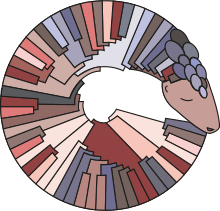
Back Phylogenetic Assignment of Named Global Outbreak Lineages Catalan Phylogenetic Assignment of Named Global Outbreak Lineages Danish Phylogenetic Assignment of Named Global Outbreak Lineages Spanish Lignées Pango French Phylogenetic Assignment of Named Global Outbreak Lineages ID PANGO Lineage NB Atribuição Filogenética de Linhagens de Surto Globais Nomeadas Portuguese Phylogenetic Assignment of Named Global Outbreak Lineages Swedish PANGOLIN Chinese
 PANGOLIN logo | |
| Initial release | 30 April 2020 |
|---|---|
| Stable release | 4.3.1[1] |
| Repository | github |
| Written in | Python |
| License | GNU General Public License v3.0 |
| Website | pangolin |
The Phylogenetic Assignment of Named Global Outbreak Lineages (PANGOLIN) is a software tool developed by Dr. Áine O'Toole[2] and members of the Andrew Rambaut laboratory, with an associated web application developed by the Centre for Genomic Pathogen Surveillance in South Cambridgeshire.[3] Its purpose is to implement a dynamic nomenclature (known as the Pango nomenclature) to classify genetic lineages for SARS-CoV-2, the virus that causes COVID-19.[4] A user with a full genome sequence of a sample of SARS-CoV-2 can use the tool to submit that sequence, which is then compared with other genome sequences, and assigned the most likely lineage (Pango lineage).[5] Single or multiple runs are possible, and the tool can return further information regarding the known history of the assigned lineage.[5] Additionally, it interfaces with Microreact, to show a time sequence of the location of reports of sequenced samples of the same lineage.[5] This latter feature draws on publicly available genomes obtained from the COVID-19 Genomics UK Consortium and from those submitted to GISAID.[5] It is named after the pangolin.
- ^ "Release 4.3.1". 26 July 2023. Retrieved 1 August 2023.
- ^ O'Toole, Áine; Scher, Emily; Underwood, Anthony; Jackson, Ben; Hill, Verity; McCrone, John T; Colquhoun, Rachel; Ruis, Chris; Abu-Dahab, Khalil; Taylor, Ben; Yeats, Corin; Du Plessis, Louis; Maloney, Daniel; Medd, Nathan; Attwood, Stephen W; Aanensen, David M; Holmes, Edward C; Pybus, Oliver G; Rambaut, Andrew (5 July 2021). "Assignment of Epidemiological Lineages in an Emerging Pandemic Using the Pangolin Tool". Virus Evolution. 7 (2): veab064. doi:10.1093/ve/veab064. PMC 8344591. PMID 34527285.
- ^ "Real-Time Epidemiology for COVID-19". www.pathogensurveillance.net. Archived from the original on 17 January 2021. Retrieved 22 January 2021.
- ^ Rambaut, A.; Holmes, E.C.; O'Toole, Á.; et al. (2020). "A dynamic nomenclature proposal for SARS-CoV-2 lineages to assist genomic epidemiology". Nature Microbiology. 5 (11): 1403–1407. doi:10.1038/s41564-020-0770-5. PMC 7610519. PMID 32669681. S2CID 220544096.
- ^ a b c d "Pangolin web application release". virological.org. May 2020. Archived from the original on 10 February 2021. Retrieved 18 February 2021.